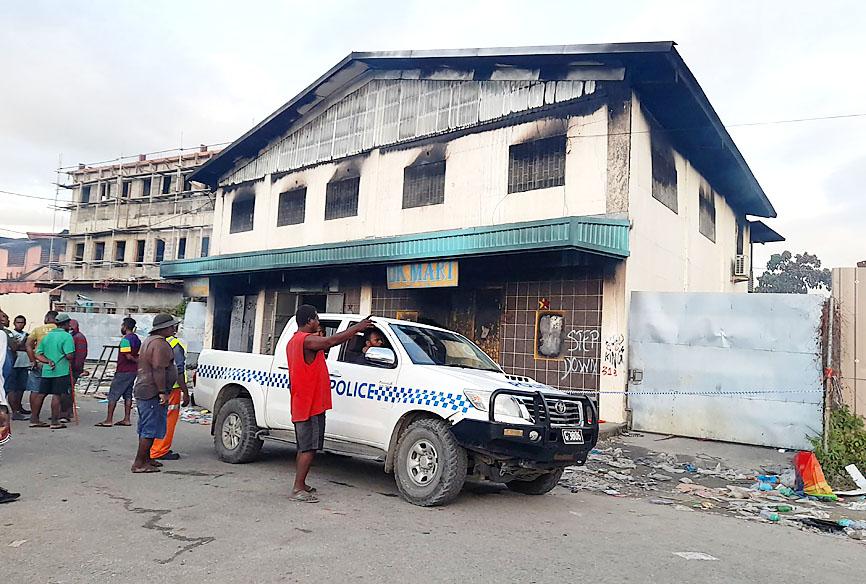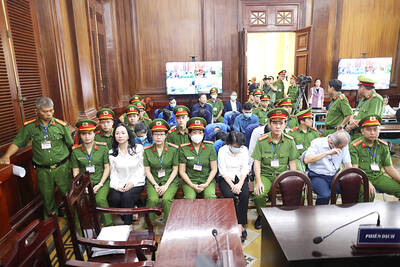Calm yesterday returned to the Solomon Islands’ capital, Honiara, after days of rioting left at least three dead and reduced sections of the city to smoldering ruins.
Fuel stations, shops and other businesses began to reopen, with Honiara residents flocking to buy basic provisions as the violence ebbed.
“The situation is very tense and anything could happen any time,” said Audrey Awao, a working mother who worried there would soon be no food left in the shops.

Photo: AFP
What began as a small protest on Wednesday quickly descended into a violent free-for-all, with poor Honiara residents joining anti-government protesters to rampage through the shattered glass and burnt-out remains of businesses for things to eat or sell.
For three days, angry mobs cut through the usually sleepy seaside capital, demanding the removal of Solomon Islands Prime Minister Manasseh Sogavare.
Two years of closed borders due to the COVID-19 pandemic have left the country’s already ravaged economy in tatters, deepening widespread joblessness and poverty among the population of about 800,000.
“Now the PM needs to step down,” a self-employed 32-year-old who gave his name as Selson said. “That’s the demand for all citizens of the Solomon Islands.”
Local police said a forensic team was working to identify the charred remains of three bodies found in a shop in the city’s burnt-out Chinatown district.
Heavily armed police were a visible presence on nearby streets as locals began cleanup operations and limited bus services resumed.
A nighttime curfew and the presence of about 150 foreign peacekeepers from Australia and Papua New Guinea appeared to have helped cool tensions.
The scale of the recovery was coming into sharp focus, even as the city remained on edge.
“It is very frustrating as it took me more than three hours to reach the fuel pump to get my vehicle fueled,” Awao said.
Many Solomon Islanders believe their government is corrupt and beholden to Beijing and other foreign interests.
“Most people are barely getting one meal a day, there are no tourists and very little economic stimulus,” said Douglas Kelson, chief officer at St John Ambulance Service.
“People do things they normally wouldn’t when they are hungry,” Kelson said.
Anger was channeled directly at Sogavare and his government, with mobs attempting to torch parliament and the prime minister’s private residence as police fired tear gas and warning shots.
More than 100 people have been arrested for riot-related activity, Solomon Islands police said, as they tried to restore order.
“No one is above the law,” Royal Solomon Islands Police Commissioner Mostyn Mangau said, urging residents to “respect each other, as well as our visiting friends from abroad.”
As tensions escalated, Sogavare begged neighbors for urgent help.
In a letter obtained by Agence France-Presse, the prime minister told his Papua New Guinea counterpart, James Marape, that “certain elements” had “attempted to overthrow a democratically elected government” and called for peacekeepers to be sent for a “period of three to four weeks.”
In an address to the nation, Sogavare said the Solomon Islands had been “brought to its knees” by the rioting, but vowed to resist calls for his resignation.
The political situation remains fraught. Opposition leaders yesterday called for a vote of no confidence in Sogavare’s leadership.
They might not yet have enough votes to pass the motion and remove Sogavare from office, but the move could produce another flash point.
The pro-Beijing leader claimed foreign powers opposed to his 2019 decision to switch the Solomon Islands’ diplomatic allegiance from Taiwan to China were behind the disturbances.
Others pointed to inter-island tensions and widespread joblessness among the country’s population — 40 percent of whom are younger than 14.

Republican US lawmakers on Friday criticized US President Joe Biden’s administration after sanctioned Chinese telecoms equipment giant Huawei unveiled a laptop this week powered by an Intel artificial intelligence (AI) chip. The US placed Huawei on a trade restriction list in 2019 for contravening Iran sanctions, part of a broader effort to hobble Beijing’s technological advances. Placement on the list means the company’s suppliers have to seek a special, difficult-to-obtain license before shipping to it. One such license, issued by then-US president Donald Trump’s administration, has allowed Intel to ship central processors to Huawei for use in laptops since 2020. China hardliners

A top Vietnamese property tycoon was on Thursday sentenced to death in one of the biggest corruption cases in history, with an estimated US$27 billion in damages. A panel of three hand-picked jurors and two judges rejected all defense arguments by Truong My Lan, chair of major developer Van Thinh Phat, who was found guilty of swindling cash from Saigon Commercial Bank (SCB) over a decade. “The defendant’s actions ... eroded people’s trust in the leadership of the [Communist] Party and state,” read the verdict at the trial in Ho Chi Minh City. After the five-week trial, 85 others were also sentenced on

‘DELUSIONAL’: Targeting the families of Hamas’ leaders would not push the group to change its position or to give up its demands for Palestinians, Ismail Haniyeh said Israeli aircraft on Wednesday killed three sons of Hamas’ top political leader in the Gaza Strip, striking high-stakes targets at a time when Israel is holding delicate ceasefire negotiations with the militant group. Hamas said four of the leader’s grandchildren were also killed. Ismail Haniyeh’s sons are among the highest-profile figures to be killed in the war so far. Israel said they were Hamas operatives, and Haniyeh accused Israel of acting in “the spirit of revenge and murder.” The deaths threatened to strain the internationally mediated ceasefire talks, which appeared to gain steam in recent days even as the sides remain far

The Taliban’s reclusive supreme leader made a rare public appearance yesterday, an Afghan government spokesman said, leading thousands of worshipers in prayers marking Eid al-Fitr. Hibatullah Akhundzada has made only a handful of public appearances since inheriting the leadership of the Taliban in 2016 and leading the movement back to power with the withdrawal of US forces in 2021. Taliban government spokesman Zabihullah Mujahid said prayer in the largest mosque in Kandahar was “performed under the leadership of the supreme leader.” In a statement on X, he said the early-morning service “was attended by thousands of compatriots” in the southern province considered the